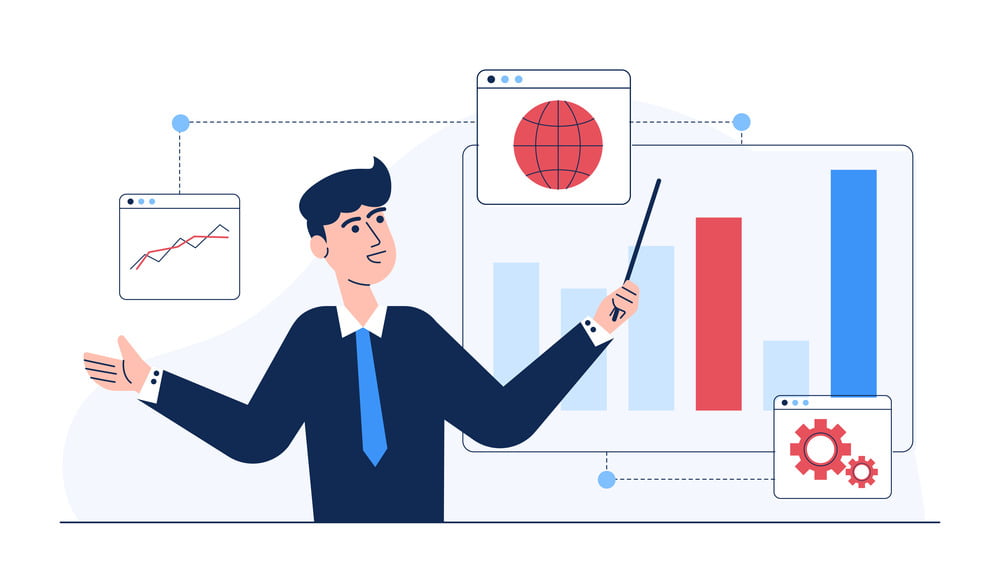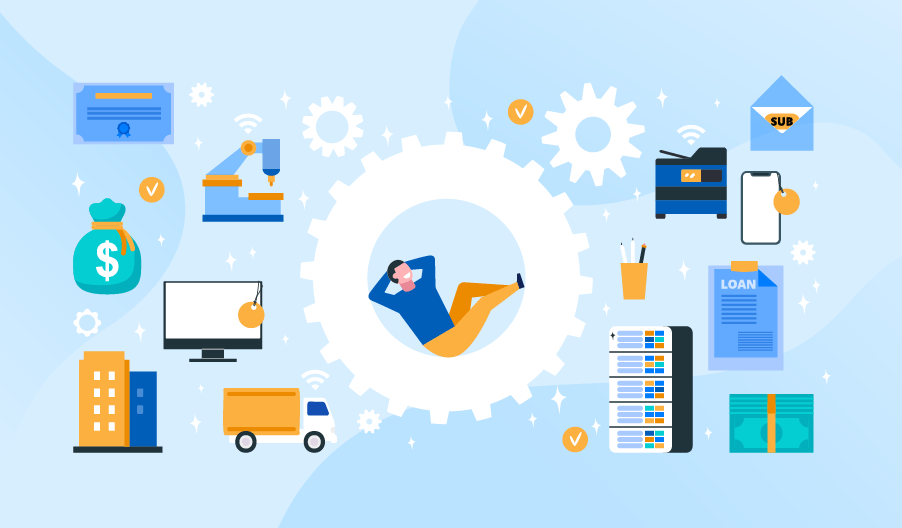A robust IT help desk software has emerged as a critical driver of operational excellence and customer satisfaction. Internally, it promptly resolves technical challenges, fostering a productive and adaptable workforce. Externally, the helpdesk cultivates customer loyalty by delivering rapid and responsive solutions.
However, a helpdesk’s performance hinges upon outcomes such as rapid response times, multichannel accessibility, structured knowledge management, etc. By synergizing these elements, organizations can cultivate a helpdesk that not only resolves issues but also proactively enhances support, optimizing operations and amplifying customer satisfaction.
In this blog, let’s strategically explore their importance and discover the attributes that define truly effective IT Help Desk Software.
Related blog: AI in Customer Service: Revolutionizing the Helpdesk with 10 Cutting-Edge Examples
What is IT help desk software?

IT Help Desk Software, often referred to as a helpdesk, plays a pivotal role as a centralized point of contact within an organization. Its primary purpose is to provide essential assistance, comprehensive support, and innovative solutions to a range of stakeholders, including employees, customers, and end-users. Functioning as a crucial hub, the helpdesk is dedicated to addressing a diverse array of concerns, spanning from intricate technical issues to general inquiries related to various products, services, and operational processes.
The central objective of IT Help Desk Software is to facilitate timely and effective problem resolution. By offering a dedicated platform for users to voice their concerns and seek assistance, the helpdesk contributes significantly to augmenting customer satisfaction and optimizing the internal dynamics of an organization. In essence, it acts as a linchpin in the service ecosystem, fostering a direct connection between those seeking support and the solutions they require.
This dynamic support mechanism operates as a coherent entity, systematically collecting, analyzing, and responding to a wide spectrum of issues that emerge across the organizational landscape. As a result, the IT Help Desk Software acts as a conduit that ensures the uninterrupted flow of operations while fostering efficient communication and collaboration. Through its multifaceted functions, the IT Help Desk Software becomes an integral component that enhances operational efficiency, strengthens customer relationships, and ultimately contributes to the overarching success of the organization.
Why is an IT Help Desk Software Needed?
Efficient Issue Resolution
Organizations often face the challenge of navigating technical disruptions and operational complexities. With the integration of multifaceted software, intricate hardware, and interdependent systems, the likelihood of encountering technical glitches and operational bottlenecks is heightened. In this context, the role of IT Help Desk Software becomes pivotal.
Comparable to a rapid-response unit, the IT Help Desk Software is poised to deliver immediate and adept assistance, functioning as a lifeline for prompt issue resolution. By swiftly diagnosing problems and executing targeted solutions, the IT Help Desk Software minimizes the potentially disruptive impact of technical issues. This, in turn, reduces downtime and ensures an uninterrupted flow of activities.
For instance, consider a software company dealing with an unexpected bug in its latest release. A robust IT Help Desk Software promptly assesses the situation, identifies the root cause, and coordinates a solution, ensuring seamless software functionality and smooth user experiences.
Customer Satisfaction
Beyond its operational utility, the IT Help Desk Software serves as a conduit for nurturing lasting customer satisfaction. The foundation of this satisfaction is built upon rapid response times, effective solutions, and personalized interactions. A timely and empathetic response from the IT Help Desk Software is akin to extending a reassuring hand to a customer facing a challenge.

Swift resolution and clear communication provide tangible evidence of an organization’s commitment to customer well-being. This fosters trust and cultivates enduring relationships, transforming initial customers into loyal advocates.
For instance, envision an e-commerce platform where a customer encounters a payment processing error. The IT Help Desk Software not only promptly addresses the issue, ensuring a seamless transaction, but also communicates a personalized message of appreciation for the customer’s business. Such interactions elevate routine transactions into memorable experiences, cementing customer loyalty.
Knowledge Centralization
A well-structured IT Help Desk Software functions as a repository of insights, amassing a wealth of valuable information, including FAQs, troubleshooting guides, and best practices. This digital repository serves as a source of enlightenment, benefiting both end-users and support agents alike.
End-users encountering recurring issues can access a treasure trove of self-help resources, expediting issue resolution and reducing reliance on external intervention. Support agents are equipped with a range of solutions, enabling them to provide informed and efficient assistance.
For instance, consider a multinational corporation contending with various software issues across its regional offices. A carefully curated IT Help Desk Software consolidates the collective knowledge of these dispersed entities, facilitating swift issue resolution and empowering users to independently navigate common challenges.
Data-Driven Decision-Making
Through meticulous data collection and analysis, IT Help Desk Software yields a wealth of metrics that illuminate operational efficiency. Issue frequency, resolution times, and customer feedback – these data points converge into a comprehensive canvas that organizations can scrutinize and interpret. This analytical perspective empowers organizations to identify trends, decipher patterns, and gain nuanced insights into user behavior and preferences.

Armed with this insight, organizations can make well-informed decisions, fostering a cycle of continuous improvement. For instance, consider a telecommunications provider navigating the complex realm of customer support. By harnessing helpdesk data, the provider identifies a recurring surge in customer inquiries following a network upgrade.
This insight prompts a proactive outreach initiative, effectively addressing concerns before they escalate into substantial issues. Consequently, this approach facilitates a seamless transition and leads to heightened customer satisfaction.
Important Types of IT Help Desk Software
Internal Helpdesk
As organizations grapple with a myriad of IT-related concerns, software complexities, and hardware issues, an internal helpdesk emerges as a crucial enabler of in-house efficiency. These IT Help Desk Software address technical quandaries, ensuring that the workforce operates seamlessly and remains focused on core tasks.
For example, a multinational conglomerate with geographically dispersed teams leverages an internal helpdesk to provide rapid assistance when an employee encounters difficulties in accessing crucial software tools. By promptly diagnosing and resolving the issue, the internal helpdesk ensures that the employee’s productivity remains unaffected, fostering a cohesive and agile work environment.
External Helpdesk
The external helpdesk is an invaluable asset for enterprises seeking to cultivate customer loyalty and uphold their brand reputation. After all, customers expect quick support when encountering product inquiries, service disruptions, or billing concerns. An external helpdesk steps into this role, functioning as a frontline support mechanism that offers timely solutions to customer queries.
Consider an online retailer renowned for its diverse product offerings. When a customer experiences difficulties in placing an order due to a technical glitch on the website, the external helpdesk swiftly responds to the inquiry, guiding the customer through the checkout process and ensuring a smooth purchasing experience. By delivering efficient assistance, the external helpdesk not only resolves the immediate issue but also fortifies the customer’s trust and allegiance to the brand.
Remote Helpdesk

This type of IT Help Desk Software leverages advanced remote access tools and digital communication platforms to troubleshoot and resolve issues from a distance.
Enterprises with dispersed workforces or customers spread across different time zones benefit immensely from the convenience and agility offered by remote helpdesks. Picture a software company that offers its services to clients worldwide.
When a client encounters a software malfunction outside of regular business hours, the remote helpdesk springs into action, accessing the client’s system remotely and resolving the issue in real time. This proactive approach not only minimizes downtime but also underscores the company’s commitment to global customer support.
Specialized Helpdesk
Industries such as healthcare, finance, or legal services often grapple with unique challenges that demand an in-depth understanding of their intricacies. A specialized IT Help Desk Software is staffed by experts equipped with domain-specific knowledge, ensuring that intricate queries are met with comprehensive solutions.
For instance, a pharmaceutical company operating in a highly regulated environment relies on specialized IT Help Desk Software to navigate regulatory compliance inquiries from healthcare professionals. The helpdesk’s adept agents possess an intricate understanding of industry regulations, enabling them to provide accurate and nuanced guidance. By offering specialized support, this type of IT Help Desk Software not only resolves issues promptly but also instills confidence in users seeking guidance within their specific domain.
Characteristics of an Effective Helpdesk
Prompt Response Time
An efficient IT Help Desk Software not only acknowledges incoming queries promptly but also establishes a sense of urgency that underscores the organization’s commitment to timely issue resolution. For instance, consider a technology company where a user encounters an unexpected software error. A well-implemented IT Help Desk Software ensures that the user receives an immediate response, acknowledging the issue and outlining the steps being taken to resolve it. This proactive approach not only allays user frustration but also fosters confidence in the organization’s support capabilities.
Multichannel Support
An effective IT Help Desk Software recognizes and accommodates varying support preferences by offering a seamless multichannel experience. By embracing an omnichannel approach, the IT Help Desk Software ensures that users can initiate inquiries and receive assistance through their preferred communication channels. For instance, a retail company catering to a tech-savvy demographic provides multichannel support that includes email, phone, live chat, and social media interactions. This strategic alignment with user preferences enhances accessibility, reduces friction, and amplifies user satisfaction, ultimately solidifying the organization’s reputation for responsive customer support.
Knowledge Management

By consolidating this information, the IT Help Desk Software empowers both users and support agents to swiftly find solutions independently, mitigating the need for frequent support team intervention. Consider a software company that maintains an extensive knowledge base accessible through its IT Help Desk Software.
When a user encounters an operational query, they can navigate the repository to access step-by-step instructions and visual guides. This self-help approach not only expedites issue resolution but also empowers users to navigate challenges autonomously, fostering a culture of empowerment and enhancing user satisfaction.
Skillful Agents
Agents embody the organization’s commitment to providing effective assistance. Possessing a blend of excellent communication skills, technical expertise, and a customer-centric attitude, skillful agents adeptly navigate complex inquiries and provide tailored solutions. A skilled support agent doesn’t merely offer solutions; they engage in empathetic interactions that instill confidence and alleviate user concerns.
For example, consider a telecommunications company with a helpdesk staffed by agents proficient in troubleshooting network connectivity issues. When a user reports network disruptions, a skillful agent not only diagnoses the problem but also guides the user through the necessary troubleshooting steps. This holistic approach not only resolves the immediate issue but also leaves the user with a positive and empowered experience.
Ticketing System
In the dynamic landscape of user inquiries, the implementation of a robust ticketing system serves as a mechanism for organized orchestration. This system systematically tracks and manages user inquiries, ensuring that each request is assigned, prioritized, and resolved within stipulated timeframes. By categorizing and structuring inquiries, a ticketing system enhances the efficiency of support agents, prevents inquiries from slipping through the cracks, and offers users a clear timeline for issue resolution. Imagine a financial institution handling a multitude of account-related inquiries.
A well-implemented ticketing system ensures that each user’s request is logged, categorized, and routed to the appropriate agent. As the inquiry progresses, the user receives timely updates, ensuring transparency and fostering a sense of confidence in the support process.
Continuous Improvement
An effective IT Help Desk Software is a living entity, continuously evolving to meet changing user needs and organizational goals. The principle of continuous improvement is a cornerstone of its success.
Regularly analyzing performance metrics, soliciting user feedback, and implementing changes based on lessons learned contribute to the helpdesk’s ongoing evolution. This iterative approach ensures that the helpdesk remains aligned with user expectations and industry best practices. For instance, a hospitality chain’s helpdesk routinely gathers feedback from both guests and support agents to identify areas for enhancement.
By acting upon this feedback, the IT Help Desk Software introduces refinements such as streamlined reservation processes and enhanced booking confirmations. This commitment to continuous improvement not only enhances user experiences but also positions IT Help Desk Software as a dynamic and resilient support resource.
Personalization
Tailoring responses and solutions to the specific needs and circumstances of each user enhances the overall user experience and fosters a profound sense of personalized care. An effective IT Help Desk Software leverages user data and historical interactions to anticipate needs and provide tailored recommendations. For example, a subscription-based streaming service employs personalization by analyzing user viewing history and preferences. Based on this data, the IT Help Desk Software suggests relevant content recommendations and troubleshoots issues specific to the user’s device, ensuring a customized and satisfying entertainment experience.
Related blog: Navigating the Path of AI-based Customer Helpdesk Software: Challenges, Benefits & Features
Conclusion
IT Help Desk Software is more than just a support system; it is the heart of an organization’s customer service and operational efficiency. Its role in issue resolution, knowledge management, and customer satisfaction cannot be overstated. As businesses continue to adapt to changing technologies and customer expectations, the importance of a well-designed and effectively managed helpdesk becomes increasingly evident. By understanding the nuances of helpdesk support, its types, and the characteristics of exceptional IT Help Desk Software, organizations can build a foundation for success and growth in a competitive and dynamic landscape.

















